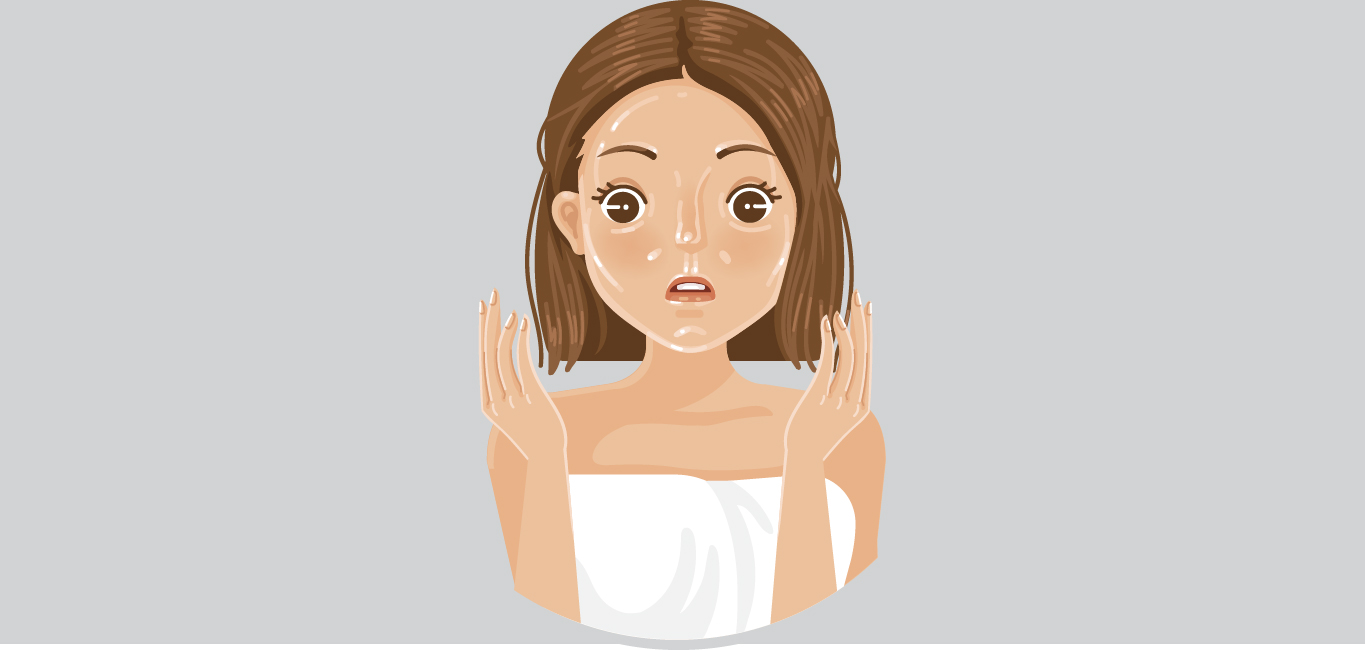
Dealing with greasy, sticky, and oily skin can be difficult all year long. It makes your face look shiny and putting on make-up becomes a hassle. Moreover, it can cause acne, make your pores bigger, and lead to more blackheads and whiteheads. That is why a good skincare routine specifically designed for oily skin is crucial and can become a game-changer.
What causes oily skin?
According to Dr Chinjitha T Davis, a dermatologist at Manipal Hospital in Goa, if your skin looks shiny and greasy, it can be oily. Factors such as genetics, hormones, stress, humidity, and environmental triggers contribute to this skin type. “Oily skin happens when the glands in our skin produce too much oil called sebum. This oil is important for keeping our skin healthy and hydrated, but when there is too much of it, it can cause problems like clogged pores and acne,” she says.
Androgens are the primary hormone responsible for oily skin in men and women. Occasionally, these hormones may cause our skin to overproduce sebum.
According to a study from 2023, people with oily skin produce excessive sebum, causing imbalanced skin moisture, which results in a shiny appearance, enlarged pores, a darker complexion, and various troublesome symptoms. Additionally, the extra oil may draw bacteria, which might result in acne, blackheads, and clogged pores.
How to tell if you have oily skin
- Your face looks shiny and feels greasy
- Make-up does not stay in place and can easily smudge or transfer
- Blackheads, pimples, or acne on the oilier parts of your face
- Pores appear larger, especially on your nose, chin, and forehead
Oily skin care routine for the day
To control regular problems that come with having oily skin, a gentle skincare routine should be followed. Dr Mohd Asif, a dermatologist and co-founder of Cara Hair Transplant and Aesthetic Center at Santacruz in Mumbai, recommends:
- Washing your face with a non-comedogenic cleanser
- Cleaning your face twice daily
- Making sure to avoid harsh scrubs and exfoliants
To help combat oily skin, Dr Davis and Dr Asif recommend following this skincare routine.
- Cleanser: Start your day by washing your face with a gentle foaming cleanser containing salicylic acid to unclog pores. This helps remove excess oil and impurities without drying out your skin.
- Toner (optional): If you like using toner, choose an alcohol-free, gentle toner to balance your skin’s pH levels and minimise the appearance of pores.
- Moisturiser: Use an oil-free, non-comedogenic moisturiser to keep your skin hydrated without adding extra oiliness. Look for lightweight formulas that would not clog your pores.
- Sunscreen: Apply a broad-spectrum, non-comedogenic sunscreen with SPF 30 or higher. Opt for a gel or water-based sunscreen for a lighter feel on your skin.
Night-time skincare routine for oily skin
- Remove make-up before bed: Apart from letting your skin breathe, this practice prevents clogged pores, reduces the risk of breakouts, and promotes overnight skin renewal.
- Cleanser: Cleanse your face with the same gentle foaming cleanser to remove dirt, oil, and make-up from the day.
- Treatment (optional): If you are dealing with acne or breakouts, apply a spot treatment containing ingredients like salicylic acid or benzoyl peroxide to target problem areas.
- Moisturiser: Use an oil-free, non-cosmogenic moisturiser to hydrate your skin overnight. Choose a formula that suits your skin type, such as a gel or lightweight cream.
- Retinol (optional): If you are looking to improve skin texture and reduce acne, consider using a retinol-based product a few times a week. Avoid using retinol during the day as it can make your skin more sensitive to sunlight.
Remember to patch test new products before applying them to your entire face and be consistent with your skincare routine for best results.
Throughout the day
Keep blotting papers handy to absorb excess oil without disturbing your make-up. Press the paper gently against oily areas to maintain a matte appearance.
Avoid touching your face frequently, as it can transfer bacteria and exacerbate acne.
Here are some things to avoid if you have oily skin
- Perform a patch test before trying new products to avoid potential irritations or allergic reactions
- Do not use chemical peels or toners with alcohol in it as they can dry out and irritate your skin
- Avoid heavy make-up and foundations with dense bases. Instead, opt for water-based and mineral-based products.
- Steer clear of skincare products containing coconut oil, cocoa butter, lanolin, harsh chemicals, exfoliants, chemical peels, and alcohol-based toners, as they can aggravate oily skin.
How to reduce facial oiliness
To get rid of the challenges posed by oily skin, Dr Davis suggests incorporating specific ingredients into your skincare routine that can work wonders. The following are the advantages of these ingredients:
- Salicylic acid: It exfoliates the skin, unclogs pores, and reduces excess oil. It effectively prevents acne breakouts and blackheads, promoting clearer skin.
- Retinoids: Known for regulating oil production and promoting cell turnover, retinoids are essential to maintain a less oily complexion and prevent pore blockages.
- Niacinamide (Vitamin B3): Niacinamide controls sebum production, calms inflammation, and reduces redness associated with oily skin, resulting in a balanced and soothed complexion.
- Glycolic acid: As an exfoliant, glycolic acid removes dead skin cells and improves skin texture and tone. It prevents the buildup of oils and debris on the skin’s surface, promoting a smoother appearance.
- Green tea extracts: Packed with antioxidants, green tea extracts combat free radicals, protect oily skin from damage, and soothe irritation, reducing redness and promoting skin health.
Conclusion
Managing oily skin is all about finding the right balance of ingredients and sticking to a consistent skincare routine. By incorporating gentle cleansers, oil-free moisturisers, and targeted treatments, you can control excess oil production, prevent breakouts, and achieve a healthier, radiant complexion. Avoid harsh products and be patient for best results.

















